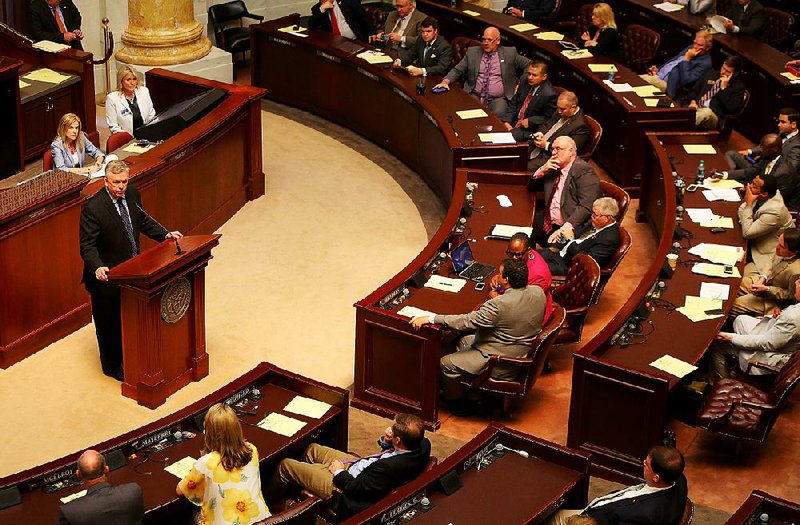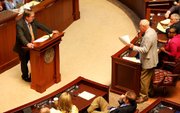Bills prioritizing the distribution of $5.33 billion in general revenue in the coming fiscal year -- up from $5.19 billion in the current fiscal year -- zipped through the Arkansas Senate and House of Representatives on Wednesday after the Joint Budget Committee endorsed the measures.
RELATED ARTICLES
http://www.arkansas…">House OKs funding for treasurer http://www.arkansas…">State Capitol news in brief http://www.arkansas…">Legislators cut family's award
The identical House Bill 1141 and Senate Bill 129 were each approved in their respective chambers and now face votes on opposite sides of the state Capitol. The bills would govern the distribution of general revenue in fiscal 2017, adding $142.7 million more than authorized in the current fiscal 2016, which ends June 30.
Calendar
This is the calendar of public events of the 90th General Assembly for today, the 23rd day of the 2016 fiscal session.
COMMITTEES
8 a.m. The Joint Budget Committee meets in the Multi-Agency Complex, Room A.
SENATE
10 a.m. The Senate convenes.
HOUSE
11 a.m. The House convenes.
The Revenue Stabilization Act bills largely mirror Republican Gov. Asa Hutchinson's proposed general-revenue budget, which factors in nearly $101 million in individual income-tax cuts proposed by the governor and enacted by the 2015 Legislature.
Most of the increased general revenue would go to the state Department of Human Services.
With legislative leaders aiming to complete business today at the state's fourth-ever fiscal session, the House voted 85-7 to approve HB1141 on Wednesday afternoon. The Senate is to consider the House bill this morning.
Joint Budget Committee co-Chairman Rep. Lane Jean, R-Magnolia, told representatives that the proposed budget amounts to about a 2.8 percent increase in spending from one fiscal year to the next.
He said the proposed Revenue Stabilization Act includes an additional $20.4 million in general revenue, sending the total to $91.5 million, for the Department of Human Services' Children and Family Services Division to help shore up the foster-care system, and $23.7 million more in general revenue for the public school fund, increasing it to $2.188 billion.
The legislation also includes $4 million more for the Department of Correction, giving it $340.7 million, and $1.5 million more for the Arkansas Economic Development Commission, for a total $12.1 million, he said.
In addition, the Revenue Stabilization Act would increase the general-revenue budget for the Department of Human Services' grants, including Medicaid, by $88 million, to a total of $1.06 billion. The act also would add $3.5 million to the budget for DHS' Behavioral Health Service Division, raising it to $82.3 million, and add $2 million for the Department of Higher Education, for a budget of $5.39 million.
The increase for the Medicaid program covers the state's required match of about $50 million a year for federal funds in fiscal 2017, according to Duncan Baird, the state's budget administrator.
The state's required match of about $40 million for Arkansas' version of Medicaid expansion for the final six months of fiscal 2017 will be covered by increased insurance-premium tax collections, Baird has said. On Jan. 1, the state will begin paying 5 percent of the cost of the private-option Medicaid expansion, and its share gradually will increase to 10 percent by 2020.
Rep. Donnie Copeland, R-North Little Rock, was the only representative to speak against the budget proposal from the House floor.
"I know this is really an exercise in futility, but I felt like I had to say this. I think it's deplorable that we're adding $120 million-plus dollars to the budget," he said.
"We have a pre-[kindergarten] ' program that has been passed but not been fully funded, and then we have almost 3,000 people on the Medicaid waiver waiting list that we still haven't addressed," Copeland said. "I think it's deplorable. I think it's actually a sin, so I'm going to be voting against it."
On the other side of the Capitol, the Senate voted 25-6 to approve SB129. The House is to consider the bill this morning.
In response to a question from Sen. Linda Chesterfield, D-Little Rock, the Joint Budget Committee co-chairman, Sen. Larry Teague, D-Nashville, said the state didn't have enough general revenue to increase state funding for the Arkansas Better Chance pre-kindergarten program.
But Chesterfield said the state's spending priorities are wrong and the state should spend more money on the pre-kindergarten program.
"I believe we are spending excessively," she said.
Sen. Bryan King, R-Green Forest, said the state spends too much in some departments when other departments are more deserving.
The state is spending at least $500,000 to raise the Human Services Department director's salary from $162,647 to $280,000, create two other administrative positions at the department, and have a governor's office employee in Washington, D.C., but isn't granting state employees a cost-of-living increase in fiscal 2017, he said.
Cindy Gillespie, who has experience working on health care policy, including for then-Massachusetts Republican Gov. Mitt Romney from 2003-2006, started work on March 1 under a consulting contract as the human services director. The Legislature last month enacted legislation authorizing her $280,000-a-year salary, with leading lawmakers saying they hope she'll help fix various problems at the department and save millions of dollars.
Hutchinson's Washington, D.C.-based director of state and federal relations is Allison Williams, who is paid $108,069 a year, according to the Arkansas Transparency website.
Teague told reporters that the governor, who last week authorized merit bonuses of up to 4.5 percent in the current fiscal year, is working on a new pay plan for state employees through the Office of Personnel Management.
"I think the theory was they'd wait [on cost-of-living raises] until that was done and figure out if some needed more," he said.
The proposed Revenue Stabilization Act divides the projected general revenue into A and B spending priority categories with $5.205 billion going to the A category, the highest priority, and another $127.9 million to the B category. Most of the increased general revenue is in Category B with the exception of the $20 million increase for the Children and Family Services Division.
Funding to Category B only flows after Category A has been fully funded.
Category A includes a proposed $13.8 million allocation for the state's so-called rainy-day fund in fiscal 2017. The rainy-day fund is intended to be used for emergencies and the governor's priorities that can't wait for the next legislative session for funding. The state has about $31 million remaining in its rainy-day fund, according to the state Department of Finance and Administration.
The proposal also would transfer about $50 million in unallocated surplus funds to the rainy-day fund.
Hutchinson wants to tap $40 million from the rainy-day fund as part of his plan to increase state highway funding in fiscal 2017 to match additional federal highway dollars available under the new federal highway bill.
Hutchinson's highway plan, released in January, relies on both surplus funds and other state revenue to obtain additional federal highway dollars.
The governor and legislative leaders said last week that their plan is to provide $1 million more in state aid for public libraries and $1 million more for senior-citizen centers through the rainy-day fund.
Teague said the rainy-day fund also may provide $5.5 million for workforce training and $1.2 million for the North Little Rock Veterans Home as well as several million dollars to help the University of Arkansas for Medical Sciences protect its bond rating.
The budget proposal also would require the attorney general to transfer $2.27 million from unobligated cash funds received from court orders or settlement agreements to the state treasury for the state Department of Veterans Affairs for start-up costs, construction, personal services and operating expenses associated with the North Little Rock Veterans Home.
A Section on 05/05/2016


